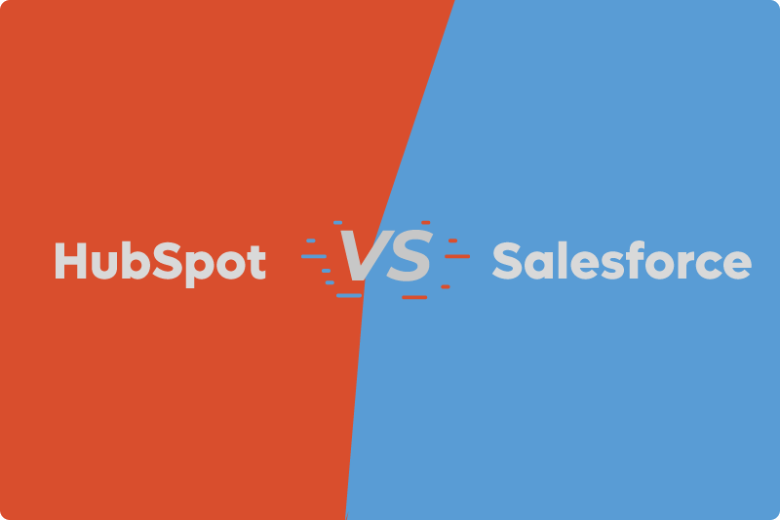HubSpot vs. Salesforce: Which CRM is Right for Your Business?

In the dynamic world of customer relationship management (CRM), choosing the right platform can significantly impact your business's growth and efficiency. HubSpot and Salesforce are two of the leading CRM systems, each offering a range of features tailored to different business needs. This comprehensive comparison delves into Salesforce and HubSpot's strengths, functionalities, and suitability, empowering you to make a well-informed decision that aligns with your business goals and operational needs.
Overview of HubSpot and Salesforce
A robust Customer Relationship Management (CRM) system can significantly impact a business's success. It is often critical to distinguish between growth and stagnation. Platforms such as Salesforce and HubSpot play pivotal roles in this realm.
HubSpot is known for its user-friendly interface and comprehensive marketing, sales, and customer service tools. It’s an all-in-one platform to help businesses attract visitors, convert leads, and close customers.
Salesforce, On the other hand is a robust and highly customizable CRM platform that caters to businesses of all sizes. It offers a wide array of tools for sales, service, marketing, and more, with extensive customization options to meet specific business requirements.
Critical Differences Between HubSpot and Salesforce
1. Ease of Use
HubSpot:
- Known for its intuitive and user-friendly interface.
- Easy to set up and use, making it ideal for small to medium-sized businesses with limited technical expertise.
- It offers a range of tutorials and a supportive community to help users get the most out of the platform.
Salesforce:
- Has a steeper learning curve due to its extensive customization options and features.
- Requires more technical knowledge to set up and maintain.
- Offers extensive training and certification programs through Trailhead, but new users might need help with the initial setup.
2. Features and Functionality
HubSpot:
- Provides a comprehensive suite of marketing, sales, and customer service tools.
- Offers robust inbound marketing features, including content management, social media management, and email marketing.
- Includes built-in automation tools and reporting capabilities.
Salesforce:
- Highly customizable with a vast ecosystem of apps and integrations available through the Salesforce AppExchange.
- Offers advanced features for sales forecasting, pipeline management, and customer service.
- Provides extensive automation options and AI-driven insights with Einstein Analytics.
3. Pricing
HubSpot:
- Offers a free CRM with basic features suitable for small businesses.
- Pricing for additional features and tools can be a la carte, making it scalable as your business grows.
- Transparent pricing structure with clear tiers and options.
Salesforce:
- Generally more expensive, with various tiers and add-ons that can quickly increase costs.
- Requires a long-term commitment, with annual contracts being the norm.
- Offers different editions tailored to the needs of small businesses up to large enterprises.
4. Customization and Scalability
HubSpot:
- Provides out-of-the-box functionality that covers most standard business needs.
- Customization options are more limited than Salesforce but sufficient for small to medium-sized businesses.
- Scales well with growing businesses but may require additional investments in higher-tier plans.
Salesforce:
- Renowned for its extensive customization capabilities, allowing businesses to tailor the CRM to their specific processes.
- Scales seamlessly from small businesses to large enterprises.
- Offers advanced development tools and APIs for custom integrations and applications.
5. Integration Capabilities
HubSpot:
- Integrates seamlessly with third-party applications, including popular tools like Slack, Mailchimp, and WordPress.
- Provides a marketplace with numerous integrations to extend functionality.
Salesforce:
- Known for its robust integration capabilities, supporting a vast array of third-party applications through the AppExchange.
- Offers APIs and development tools for custom integrations, making it suitable for complex business environments.
When to Choose HubSpot?

1. Small to Mid-Sized Businesses:
HubSpot is ideal for small to medium-sized businesses that want an easy-to-use, all-in-one solution without a hefty price tag.
2. User-Friendly Experience:
HubSpot is an excellent choice if your team values a simple, intuitive interface that’s easy to learn and use and has limited technical expertise.
3. Inbound Marketing Focus:
HubSpot’s comprehensive marketing tools greatly benefit businesses that are focusing on inbound marketing strategies.
4. Budget Considerations:
If you have budget constraints or are a small business looking for a cost-effective CRM solution, HubSpot’s free tier and scalable pricing are advantageous.
5. Quick Setup:
If you need a CRM that is up and running quickly without extensive customization, HubSpot offers a straightforward setup process.
6. Scalability
p>HubSpot is a solid option if you anticipate growth and want a CRM that can quickly scale with your business without significant upfront investment.
When to Choose Salesforce?

1. Large Enterprises:
Salesforce is a powerful tool for large organizations that require a highly customizable and comprehensive CRM solution.
2. Customization Needs:
If your business requires extensive customization to fit specific processes and workflows, Salesforce’s robust customization options are ideal.
3. Complex Sales Processes
Salesforce's advanced features and automation capabilities benefit businesses with complex sales processes and workflows.
4. Advanced Features:
If you need advanced features like AI-driven insights, detailed sales forecasting, and complex automation, Salesforce provides these tools.
5. Long-Term Investment
If you’re prepared for a long-term commitment and can invest in a more expensive CRM solution, Salesforce offers unparalleled depth and breadth of features.
6. Integration Requirements:
Salesforce's integration capabilities are unmatched for businesses that need to integrate with a wide range of third-party applications or require custom integrations.
Which is right for your business?
Choosing between HubSpot and Salesforce hinges on specific business needs, company size, and growth objectives.
HubSpot is an excellent option if your priority is a straightforward, all-in-one platform that's easy to set up and use. It provides integrated marketing, sales, and service tools that streamline operations for small—to mid-sized businesses. HubSpot's strength lies in its user-friendly interface and robust automation features, making it ideal for companies looking to enhance efficiency without extensive technical expertise.
Conversely, Salesforce stands out for its extensive customization capabilities and scalability. It caters primarily to larger enterprises with complex CRM requirements. It offers advanced features like customizable workflows, deep analytics, and industry-specific solutions tailored to healthcare, finance, and retail sectors. Salesforce's ecosystem supports integrations with various third-party applications, enabling businesses to create tailored CRM solutions that align closely with their operational needs.
Conclusion
Choosing between HubSpot and Salesforce ultimately depends on your business’s needs, goals, and resources. Evaluate your business objectives, budget, and technical capabilities to determine which CRM best fits your needs. By making an informed decision, you can leverage the strengths of HubSpot or Salesforce to drive growth, improve customer relationships, and achieve your business goals.
If Hubspot is your choice, then we can help you!
If you choose HubSpot, then we can support you on your journey. As a HubSpot Platinum Solutions Partner, Inboundsys offers unparalleled expertise and a comprehensive suite of services to help businesses leverage the full potential of HubSpot’s powerful CRM platform.
Here’s how Inboundsys can support your business:
- Expert HubSpot Implementation and Onboarding
- HubSpot Web Development
- Customized Marketing Solutions
- Sales Enablement
- Advanced Reporting and Analytics
- Ongoing Support and Optimization
- Integration with Third-Party Tools
- Tailored Service Solutions
- Strategic Consultation and Planning
Partnering with Inboundsys means leveraging the expertise of a trusted HubSpot Platinum Solutions Partner dedicated to driving your business growth. Contact us today to learn more about how we can help you maximize the potential of HubSpot and achieve your business objectives.

Puja is an artistic, creative, and passionate Client Success Manager at Inboundsys. She has more than 15 years of experience in web designing and the Ed-Tech platform. Over the years, she has essayed multiple roles, from being a web designer, content writer, teacher, and business analyst to a quality analyst. She has exceptional analytical skills, interpersonal communication skills, and organizational skills. Her keen ability to break down and synthesize information and attention to detail while envisioning the bigger picture makes her a genuine people person and build healthy relationships. She is an eloquent writer and has written many blogs on Ed-Tech and other web technologies. During her free time, she likes reading books on recent technological developments and non–fiction books and satiate her creative instincts through painting and cooking.
